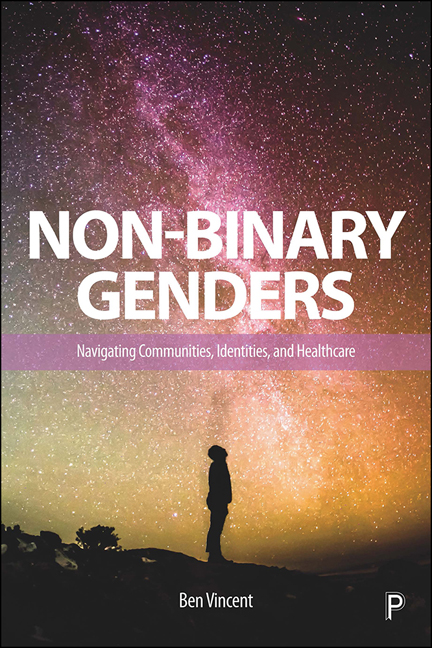Book contents
- Frontmatter
- Dedication
- Contents
- List of Figures and Tables
- Notes on the Author
- Acknowledgements
- Introduction
- 1 Reviewing Non-Binary: Where have we Come From?
- 2 Doing and Being: My Relationship with this Work, and how it was Done
- 3 ‘Not Trans Enough’: The Relationship Between Non-Binary Gender Identities, Uncertainty and Legitimacy
- 4 Non-Binary Times, Non-Binary Places: Communities and their Intersections
- 5 Views of the Clinic: Non-Binary Perceptions and Experiences of General Healthcare Services
- 6 A Strong Motivation to Tick The Boxes: Non-Binary Perceptions and Experiences of Gender Identity Clinics
- Conclusion
- References
- Index
1 - Reviewing Non-Binary: Where have we Come From?
Published online by Cambridge University Press: 10 March 2021
- Frontmatter
- Dedication
- Contents
- List of Figures and Tables
- Notes on the Author
- Acknowledgements
- Introduction
- 1 Reviewing Non-Binary: Where have we Come From?
- 2 Doing and Being: My Relationship with this Work, and how it was Done
- 3 ‘Not Trans Enough’: The Relationship Between Non-Binary Gender Identities, Uncertainty and Legitimacy
- 4 Non-Binary Times, Non-Binary Places: Communities and their Intersections
- 5 Views of the Clinic: Non-Binary Perceptions and Experiences of General Healthcare Services
- 6 A Strong Motivation to Tick The Boxes: Non-Binary Perceptions and Experiences of Gender Identity Clinics
- Conclusion
- References
- Index
Summary
Medical practitioners and institutions have the social power to determine what is considered sick or healthy, normal or pathological, sane or insane – and thus, often, to transform potentially neutral forms of human difference into unjust and oppressive social hierarchies. (Stryker, 2008a: 36)
Introduction
This chapter situates non-binary gender identities within existing research. I have already addressed the point that non-binary genders can be differentially conceptualised as distinct from, cutting across, or under the trans umbrella. However, it is fair to situate the work done on non-binary genders within transgender studies (in addition to any other fields in which a particular scholar or team works). I characterise this as an inherently interdisciplinary field, with important contributions from scholars of anthropology, medicine, literature, law and sociology, among others. I aim to show how the academic consideration of gender diversity has produced a varied and expanding range of literature that vitally informs the specific consideration of non-binary identities.
Each section of this chapter will approach gender diversity from different disciplinary angles, presenting these literatures roughly chronologically. I begin with a brief recognition of early-modern history, before traversing work on/from medicine and (what we would now term) trans. I then engage with work that critically scrutinises power dynamics within medical practice, and how medical scholarship has framed trans. The majority of this work was prior to the manifestation of the term non-binary as it is now deployed, yet remains a vital prelude to contextualise specific non-binary scholarship, rooted as it is in the clinical and social consideration of gender diversity.
I follow this by engaging with the literature that explicitly recognised ‘third gender categories’ prior to the cultural shift whereby non-binary began entering more mainstream contexts. This literature is comprised of non-Western or historical analyses, unemphasised parts of older trans research, or consideration of genderqueer or non-gendered identities. This leads to the 21st-century concept of non-binary genders, and the body of specific or related work that is now emerging. Only the most recent examples of this scholarship recognise non-binary identification as an (umbrella) category in its own right, with older work implicitly illustrating non-binary variation before the term ‘non-binary’ entered academic or queer community contexts. I aim to look at the literature through a non-binary lens to consider how gender diversity has been scholastically interpreted, and what discursive impacts this may have had on contemporary consideration of trans/non-binary people.
- Type
- Chapter
- Information
- Non-Binary GendersNavigating Communities, Identities, and Healthcare, pp. 19 - 44Publisher: Bristol University PressPrint publication year: 2020



